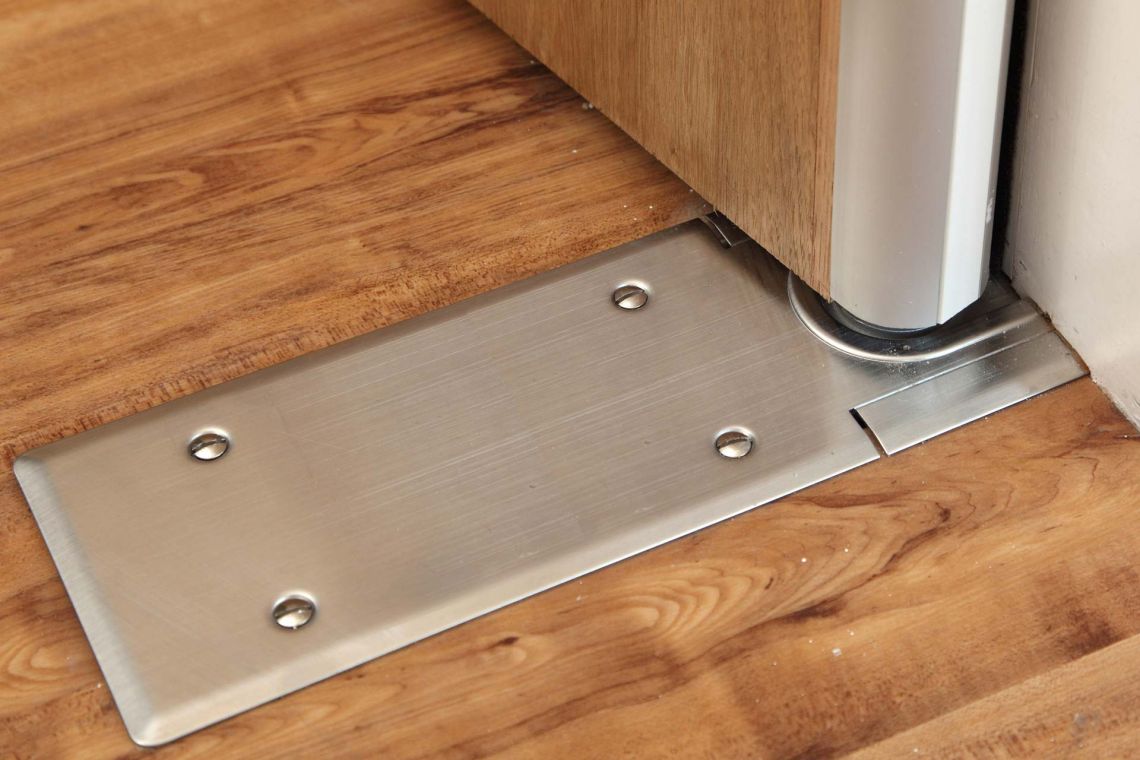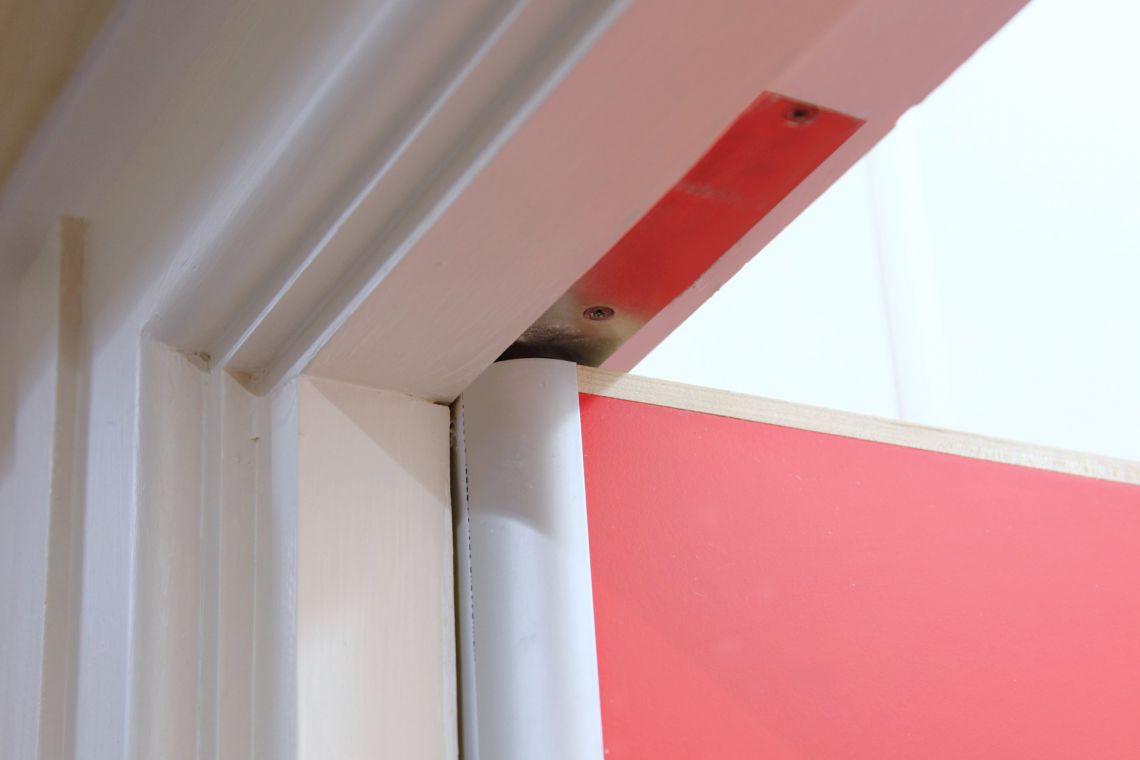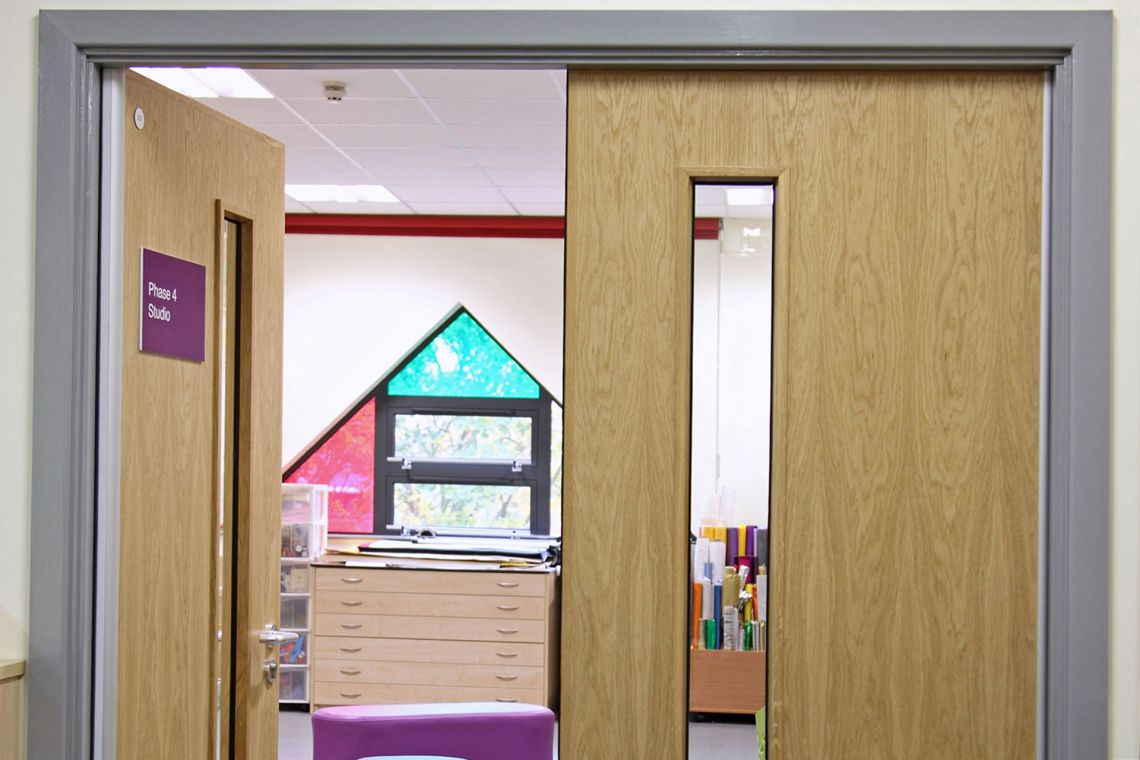

MARKET LEADER FOR DURABLE FINGER GUARDS
Saving up to £1,000 in life costs, our integral finger guards satisfy Employer's Requirements. Because of this, they are used by more than 80% of Local Education Authorities and numerous independent schools across the UK – setting the industry standard for finger protection in the Education sector.
Safe and durable integral finger guards for schools
As market leader, our integral finger guards are safe and durable, with cost-savings of £500-£1,000.
Providing durability

Made from robust aluminium, our integral finger guard lasts the lifetime of the door.
Designed to withstand any knocks and bashes, this lasts longer than plastic guards.
Improving safety

Using pivots and a rounded edge to minimise the gap between door and frame, our integral finger guard improves safety through designing out the problem of trapped fingers.
As the door opens and closes, the gap remains constant at just 2mm – too small for fingers to get in harm’s way.
Enabling cost-savings

Because our finger guards have been robustly designed, they last longer than plastic guards. Once fitted, the integral finger guard will last the lifetime of the door, removing the need for regular replacements and saving between £500 and £1,000 per door over 25 years compared to plastic.

Durable finger guards save over £20 million in life costs
Following a 2016 study by the Royal Institute of British Architects (RIBA) revealing that costs of £150 million could have been avoided if schools had been better, we calculated that we have saved Local Education Authorities around £20 million in life costs. Since launching our range of durable finger guards in 2009, these cost savings have been achieved through the robustness and durability of our products in high traffic environments such as schools.
"We decided to use Alumax on a 'spend-to-save' basis across all new primary and special needs schools." Education Department, Manchester City Council
Finger guards that satisfy Employer's Requirements
With the growth in design and build schools, Local Education Authorities (LEAs) benefit from a meaningful and robust Employer's Requirement statement to ensure they receive finger guards which meet safety standards.
As our finger guards are durable, safe and cost-effective, they satisfy Employer’s Requirements, unlike plastic, rubber and roller blind alternatives.
DISCOVER HOW OUR FINGER GUARDS SATISFY EMPLOYER'S REQUIREMENTS
Limitations of existing finger guards
Plastic
Plastic
As the first attempt at finger safety, plastic guards covered the gap between the door and frame. In some situations, like the home, they’re safe and do the job. However, in high traffic areas, like schools, hospitals, restaurants and retail environments, they’re simply not durable enough.
They crack and split
Although cheap, plastic finger guards aren’t built to last. Typically, after between six months and two years of normal use in schools, GPs, restaurants or swimming pools, they split and need replacing. And once broken, the original danger is exposed, putting fingers at risk.
A maintenance liability
The real cost of a plastic finger guard is anything but cheap. Taken over the typical 25-year lifespan of a school, replacing them costs between £500 and £1,000 per door, making them the most expensive option.
Look cheap
Plastic guards can be unsightly and rarely blend in with the environment. If the interior finish and doors have been carefully planned – perhaps in colourful laminate or attractive veneer – the finger guard should be just as aesthetically pleasing.
Rubber
Rubber
Flexible rubber hinge covers were developed to address the durability issues of plastic finger guards. Hard wearing and tough, they cover the complete gap, however fingers can still become trapped.
Doesn’t solve the problem
Rubber guards merely cover the gap between the door and frame. The rubber cover is rarely taut enough to prevent the guard being pushed into the hinge gap. This leaves open the possibility of fingers wandering into the gap and being trapped in a closing door.
Highly visible
Concertina-like rubber hinge covers are made from a material not usually used on doors. Even in the closed position, customers comment they’re eyecatching and impact the overall aesthetic.
Gathers dust and grime
The soft rubber surface attracts dust and is hard to clean. The folds also gather grime, which can become a hiding place for bacteria.
Roller blind
Roller Blind
The single roller blind uses fabric tension to resist fingers pushing into the gap. And when you consider the cost of hinges, the roller blind finger guard, and the fitting, the cost is similar to our integral finger guard – which designs out the problem, offering superior safety and aesthetics.
Just hides gap
Unlike our clever designs, roller blind finger guards use fabric tension to create resistance and prevent trapped fingers. This is mostly effective but it’s not foolproof.
Affects opening force
The fabric tension resistance can make it challenging to comply with Approved Document M and BS 8300 (Opening Force for a Door).
A costly compromise
Roller blinds cost around the same as our Alumax integral finger guard — yet compromise on aesthetics. And if cost is an issue, our retrofit finger guard makes the perfect alternative. It’s durable and doesn’t impact the opening force.

London Borough of Barking & Dagenham
Before approaching us in 2012, the London Borough of Barking & Dagenham endured plastic fingers that broke frequently, looked unsightly and exposed the original risk when cracked.
They were looking for something more suitable for their busy schools. So we worked closely with their education services and design team to underdstand their problems, and helped create a generic specification for their Employer's Requirement's.
They now specify 'integral finger guards' on their new build schools and major refurbishments to ensure they get a finger guard fit for purpose.
Specifying 'integral finger guards'
Because of the limitations of alternative finger guards, we've work closely with a range of LEAs to help them make a small change to their Employer’s Requirements so that they now include ‘integral’ when asking for finger guards. This ensures they receive a safe and durable guard that’s fit for purpose – and within the constraints of the public sector tendering framework.
Plus, this small change to the Employer's Requirements is only required to be made once, saving time when specifying future projects and providing peace of mind that safe, durable and best-value finger guards will be installed.
Request a meeting
Our specification team is based across the UK and works regularly with LEAs to create a standard finger guard specification – saving time, making specification easier and ensuring you receive a finger guard that's fit for purpose.
